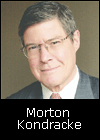Left-Out Moderates Actually Could Rule, New Study Shows

Embedded in a much-discussed and brilliant new analysis of U.S. political polarization is this sad fact: The moderate near-majority of Americans is left out of our political process.
As Democratic scholars William Galston and Elaine Kamarck point out, self-identified moderates have outnumbered conservatives and liberals consistently for the past 30 years. [IMGCAP(1)]
And yet liberals, just 20 percent of the electorate, dominate the Democratic Party while conservatives, at 33 percent, own the Republican Party. The remaining, moderate 47 percent is forced to choose between ever- widening extremes.
“Our politics is more polarized than the people themselves,” Galston and Kamarck write in their paper, “The Politics of Polarization,” and “the system of polarized parties does not provide a natural home for the plurality of Americans who define themselves as moderates.
“Indeed, it leaves them frustrated, unrepresented and alienated from political life. … Many Americans do not want to choose between individual liberty and national security, between social tolerance and moral tradition or between military strength and international cooperation, and they resent a politics that forces them to do so.”
It would be wonderful if moderates — and I’m one — could establish a third party and seize power for the sensible center. Alas, given the structure and history of our political system, it’s not going to happen.
But what moderates can do is realize how big their numbers are, how powerful they are in general elections — they decide them, in most cases — and start exerting their influence in the primary system.
Galston and Kamarck write that “the polarization of the parties has created an opportunity for a political leader — from the center-right or the center-left — to capture the hearts and the votes of the vast legion of moderate voters who are not comfortable calling either party ‘home.’”
The problem is, such a political leader has to get nominated. The only way for that to happen is for moderates not to sit on the sidelines during the primary process and instead to fight for middle-of-the-road candidates.
Michael Barone, in U.S. News and World Report, recently made the case that 2008 may be the moderates’ moment — that leading contenders from both parties are cutting moderate profiles, including such Republican candidates as Sens. John McCain (Ariz.) and Chuck Hagel (Neb.) and former New York Mayor Rudy Giuliani, and such Democrats as Sens. Hillary Rodham Clinton (N.Y.) and Evan Bayh (Ind.) and Govs. Mark Warner (Va.) and Tom Vilsack (Iowa).
Maybe. But experience suggests that the primary process will force Democrats to toe lines dictated by teachers unions, extreme feminists, doves and civil rights groups, and that Republicans will have to hew to the views of hard-line evangelicals, anti-taxers and anti-immigration nativists.
For that not to happen, moderate candidates in each party will have to stick to their principles under pressure, and moderate voters in each party will have to back them with energy, organization and money.
Kamarck and Galston, in the report written for a new Democratic think tank, Third Way, make a strong case that Democrats have more reason to go to the center to win elections than Republicans do.
That’s because of simple math. “The Republican party’s conservative activist base is 50 percent larger than the Democrats’ liberal base,” they write. “That’s been true for every election dating back to 1976. When American politics turns into a shootout between liberals and conservatives, conservatives almost always win.”
In 2004, Sen. John Kerry (D-Mass.) actually carried 54 percent of the moderate vote, but still lost the election. Democrats need at least 60 percent of that vote to win.
Galston and Kamarck convincingly argue that Democrats can’t win simply by mobilizing their base, by depending on Hispanics (who are increasingly voting Republican) or by out-promising the GOP on domestic policy.
They have to be seen as strong on national defense and middle of the road on cultural issues, which means genuinely respecting religious values (not just quoting Bible verses), favoring civil unions rather than gay marriage and, on abortion, favoring parental consent and bans on partial-birth abortions.
It also means, they say, nominating candidates who exude personal strength and integrity and who can appeal to America’s one remaining swing region, the Midwest.
The GOP starts out with a bigger base than Democrats, but Galston and Kamarck demonstrate that President Bush won his popular majority in 2004 not simply by turning out more evangelicals, but by winning two historical swing groups, Roman Catholics and married women.
The bottom line is that moderates actually decide elections, but they do so passively, making a hard choice between two candidates chosen, largely without their input, by the ideological extremes.
What moderates need to do is realize that they are crucial to both parties’ fortunes and begin exercising their power. If moderates nominated and elected a president, he or she might actually win in a landslide, come to office with a governing mandate and ease the polarization that’s poisoning politics.





